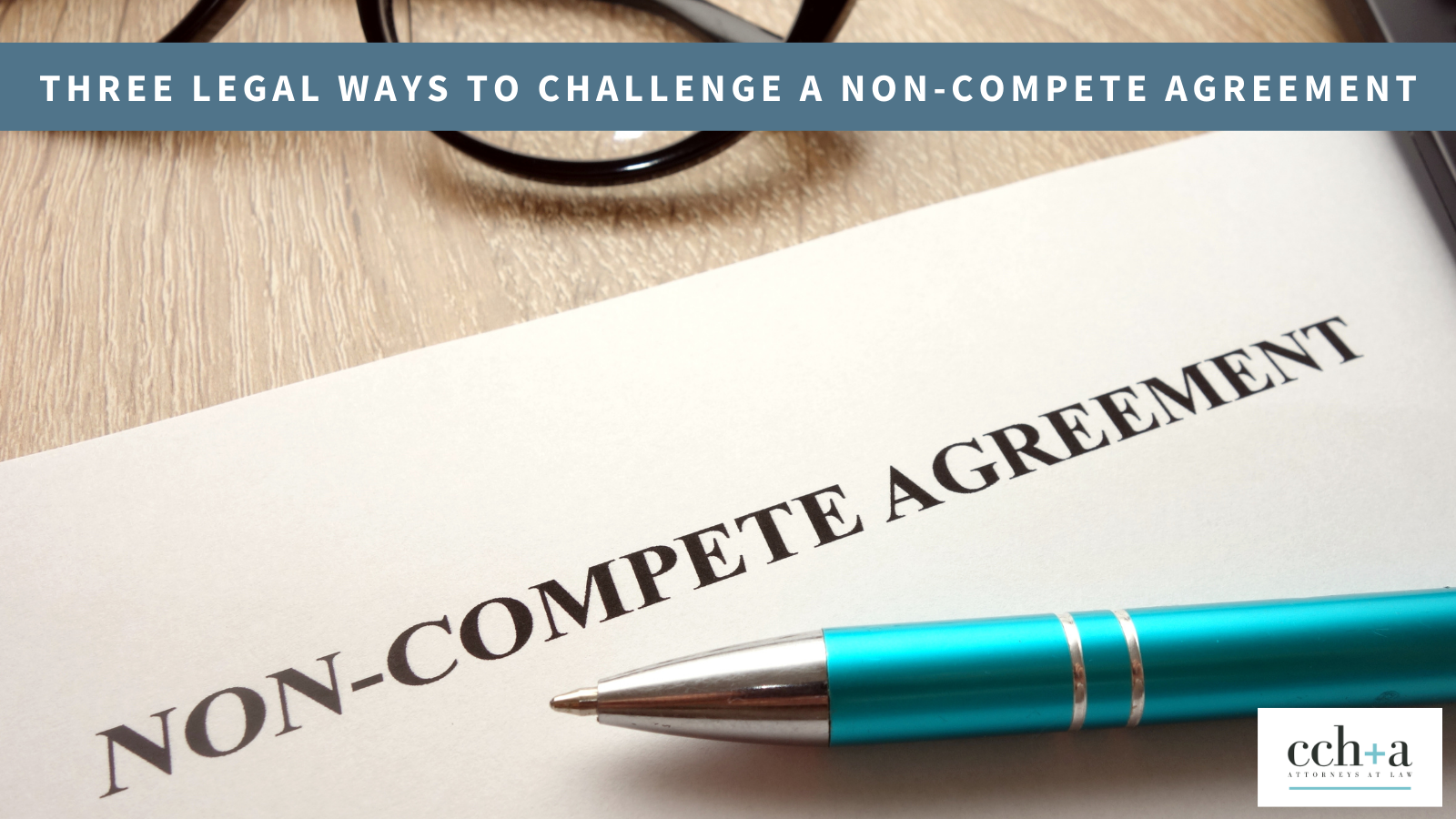Three Legal Ways to Challenge a Non-Compete Agreement

Author: Jessica L. Billingsley
POST DATE: 2.17.21

A few years ago, when you accepted your current job, you happily signed all the paperwork put in front of you by your new employer.
Now, as you consider a change, you realize one of those many documents was a non-compete agreement. Will it prevent you from forging ahead in your career? Is there any way out? In this blog, CCHA examines three legal ways to challenge a non-compete agreement.
What is a Non-Compete Agreement?
In its most basic form, a non-compete agreement protects an employer by preventing an employee from starting a competing business or going to work for a competitor within a stated period of time after the employment relationship ends.
Indiana courts will uphold reasonable non-compete agreements. However, there are times when a non-compete agreement can and should be challenged by an employee who has left the business.
When first contemplating a change, inquire with your employer if they would voluntarily release you from the non-compete agreement. An employer may not consider your new venture a threat to their business and thus, may release you from the non-compete agreement altogether. In such instances, ensure you request your employer document any release in writing.
Unfortunately, if your employer views your new career path as competition, they may not release you voluntarily from the non-compete agreement. In such cases, you may have some grounds to challenge the enforcement of the non-compete.

1. Unreasonable terms
Indiana courts will not enforce a non-compete unless its restrictions are reasonable in scope as to time, activity, and geographic area restricted.
Depending on the language of your non-compete agreement, you may be able to challenge the reasonableness of the terms. For example, Indiana courts have found non-compete agreements that restrict competitive activity for a two-year period after separation to be reasonable. If your non-compete agreement is longer, you may have cause to challenge it. Likewise, if a non-compete restricts an employee from doing business throughout the entire state, but the employer only does business in the Indianapolis area, there may be cause to challenge it.
2. So-called “confidential” information is publicly available elsewhere
Employers often claim non-compete agreements are necessary to protect valuable secret client sources. However, employers who claim they are protecting valued client data and sources have the burden of proof. They must have evidence to prove that the information is not available to others in the industry. In instances where the alleged “confidential” information can be obtained through publicly available or otherwise non-exclusive methods, that portion of the non-compete will not likely be found enforceable. For example when a company’s sales leads may be retrieved from phone books, industry directories, the internet, and other public sources, a court will not be as likely to find the non-compete agreement enforceable.
3. Employer Breaches
Just as you are held accountable for what you sign, so too is your employer. If your employer breaches your employment agreement - which also contains an agreement not to compete - the non-compete may not be enforceable. As a side note, make sure that every term you negotiate with your employer is written down in your contract. While verbal contracts are legally binding, they can be difficult to prove.
Here are just a few examples of possible employment contract breaches by an employer: an employer fires you without good reason; despite a two-year contract, your employer dismisses you without providing notice or pay; despite contract terms, an employer promises to pay you a $60,000 annual salary, but starts you at a lower rate of pay.
In the event your employer breaches your agreement, you should first take it to your employer. It could come down to a miscommunication and there may be a simple fix. If this is not the case, you may be forced to take additional steps including alternative dispute resolution or even legal action.
Engaging a Trusted Attorney
Litigation is expensive, thus CCHA recommends trying to maneuver your exit from a business in as amicable a way as possible when you have a non-compete agreement in place. If you can prove to your current employer that your next venture will not compete with them, you are working outside their geographic area, or you plan to work for a competitor after a reasonable amount of time, etc., you will be far more likely to be released from your agreement.
If, however, your situation does find you in a dispute, CCHA’s Labor + Employment attorneys are here to help navigate you towards resolution.
Contact CCHA for your labor+ employment challenges
The Labor + Employment Practice Group at CCHA is here and ready to provide the proactive guidance crucial to building and maintaining a productive working environment. If litigation ensues, we have extensive experience in both federal and state courts, as well as federal, state, and local fair employment practices agencies, so contact us for a legal partner you can trust.